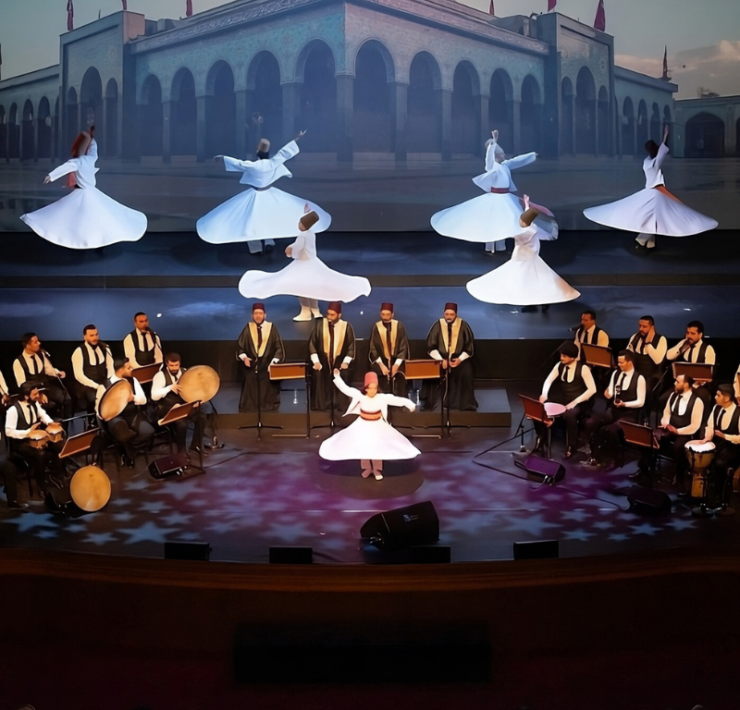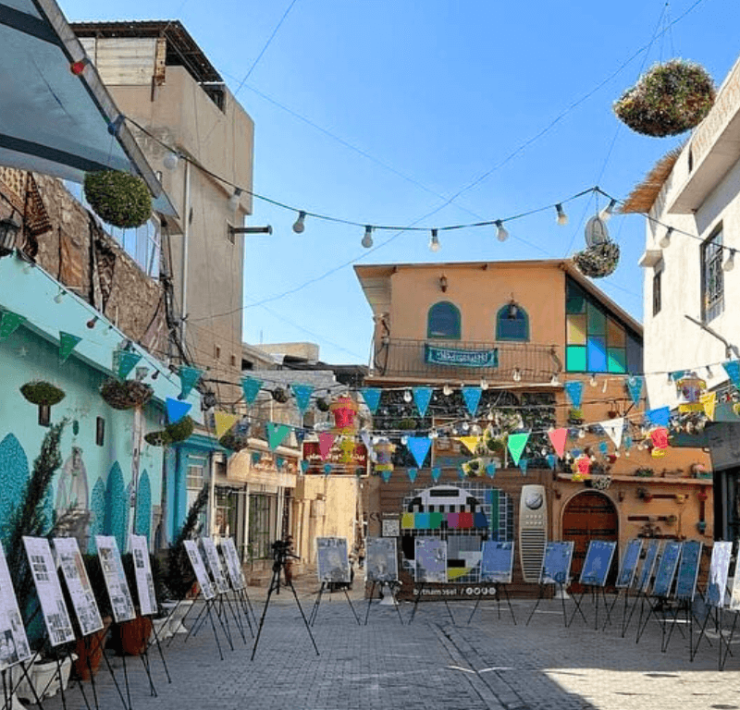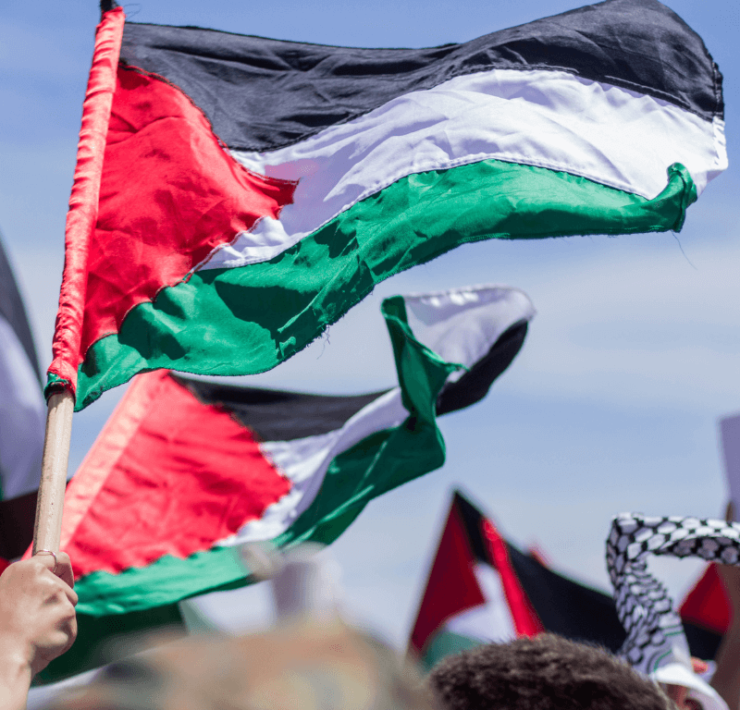January, 2014. Assad’s fall from power is inevitable. His army is haemorrhaging combat power through defections, demoralisation and tactical defeats. The coalition of nationalists and Islamists are cutting a path to Damascus like a scimitar through flesh.
Six months later and Assad is not only still in power, but he is regaining territory from the rebels. Something drastic changed in those early months of 2014. Iran, long an ally of the Assad regime, mobilised Hezbollah – it’s client militia based in Lebanon – and set it loose against the Syrian opposition forces. Like cement, Hezbollah soldiers were poured into the gaps left in Assad’s beleaguered force, hardening his imminently collapsing military effort.
On the face of it, Hezbollah is an autonomous social movement, forged from the furnace of Lebanese resistance to the Israeli occupation of 1982. In keeping with this vein of resistance, it then sent fighters against the Serbs in Bosnia, and waged a second successful insurgency against an Israeli occupation in Lebanon. Filling the vacuum left by government neglect of its heartland in the poorer Shia areas of Southern Lebanon, it took on administrative functions, and to this day effectively governs those areas as a political party.
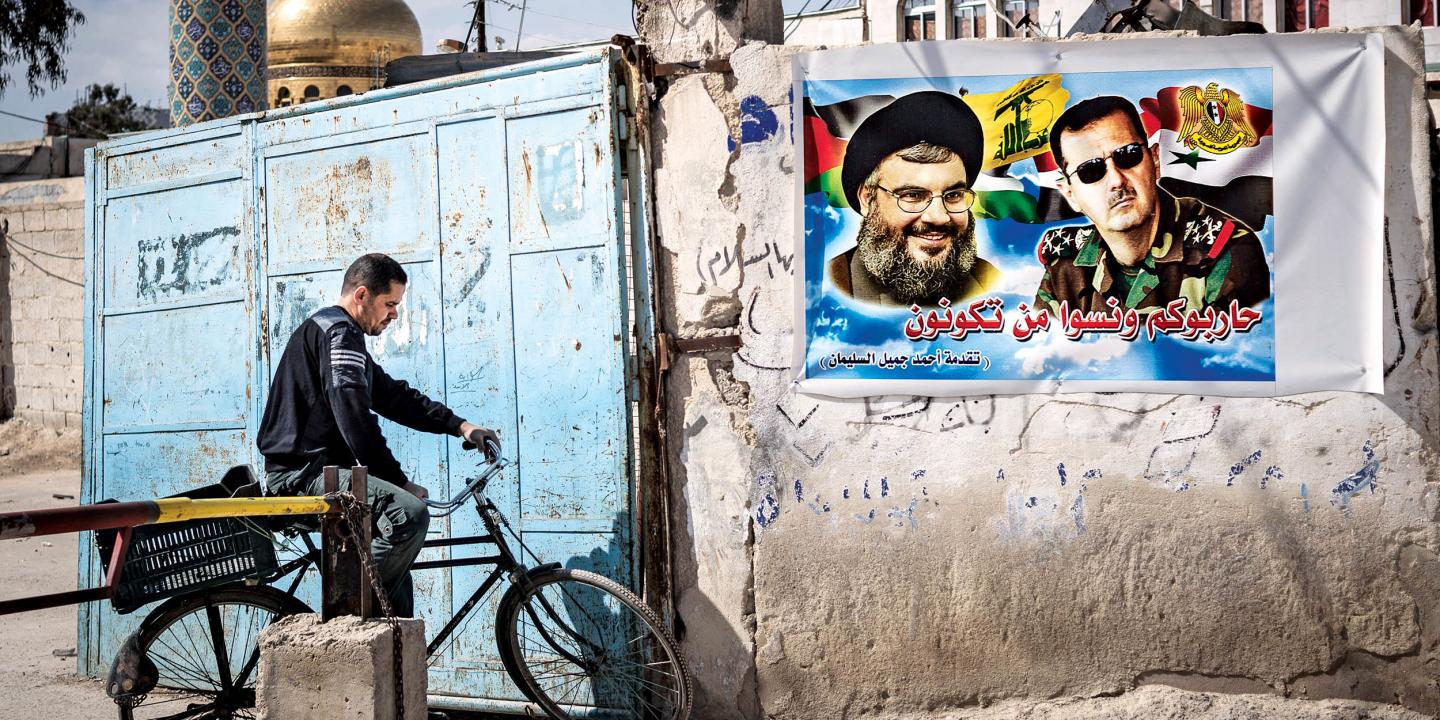 A poster Bashar al-Assad and Hassan Nasrallah, Secretary General of Hezbollah, in Sayeda Zainab, Syria (image: Newsweek)
A poster Bashar al-Assad and Hassan Nasrallah, Secretary General of Hezbollah, in Sayeda Zainab, Syria (image: Newsweek)
However, it’s military success as a guerrilla force and its gubernatorial effectiveness as a political party are forever beholden to Iranian support and forever sullied by its propensity for suicide bombings and torture. The latter caused Western governments to designate it a proscribed terrorist group, which consequently increased its dependence on the former – Iranian money and arms.
Hezbollah’s Iranian patrons leveraged this dependency when Bashar al-Assad – their only Arab ally – was in imminent danger of being toppled by a Western-backed revolution. At best they needed to maintain the status quo, and failing that they needed enough of a hand in the ensuing civil war to be granted a place at the negotiating table. Using the Quds force (the special forces unit of Iran’s Revolutionary Guard) to command and mentor Assad’s army would not have been sufficiently decisive on its own. It was time for Iran to call on Hezbollah to pay up their pound of flesh, in terms more literal than figurative.
Hezbollah was to be the vital pro-Assad “boots on the ground” which the anti-Assad coalition never achieved for themselves. They provided the capability to retake ground lost to the rebels – a function which was beyond the capacity of the stationary-thinking conscript Syrian army. As such, the first instances of the regime taking back lost territory – in Qusayr and Kalamun – were operations undertaken by Hezbollah.
 Nasrallah addresses supporters in a rare public appearance in Beirut (image: The Times of Israel)
Nasrallah addresses supporters in a rare public appearance in Beirut (image: The Times of Israel)
Without their tactical victories and ground-holding ability, Russia’s aerial support would have been as ineffective at propping up Assad as America’s aerial war has been at defeating Daesh (ISIL). Without Hezbollah’s ground-manoeuvre element, Russian air power and Iranian mentoring would echo the West’s ineffective anti-Daesh campaign, and would be caught lacking in the same way.
Hezbollah has been a major keystone propping up Assad’s military effort on the ground, and its removal would put the campaign in a precarious position, more so if the other mainstays of Assad’s ground war – the miscellany of Shia militias – are dealt a crushing moral blow upon watching their more professional Hezbollah counterparts exit the scene. This would put Assad, the Alawites, and other Syrian minorities at the mercy of a Sunni coalition poised to wreak bitter, fanatic retribution, and would thereby force the Syrian regime toward the negotiating table.
Militarily, Hezbollah cannot be pushed out of Syria. Instead, they must be pulled back home to Lebanon. They are not merely a mercenary outfit – they are a political party, an administration, a governing organisation with their own wider priorities which lie in Lebanon. Herein lies a key vulnerability; much like national armies, they are beholden to the second and third order effects of their interventionist foreign policy decision, and how they are perceived by their “electorate” – or in this case, their civilian support base.
 A Hezbollah rally in Machghara, Lebanon (image: PBS)
A Hezbollah rally in Machghara, Lebanon (image: PBS)
The intervention on behalf of Assad’s dictatorial government is problematic for Hezbollah’s narrative as a resistance movement. It has adopted the media line that the intervention is aimed at securing the Lebanese border and pushing back the “terrorists”, namely Daesh and the descendants of Jabhat al-Nusra (Al-Qaeda’s former affiliate in Syria). The reality however is that the Lebanese are acutely aware that Hezbollah is in Syria at the beck of its Iranian paymasters. This in itself is not overly problematic, but the wider consequences are.
Hezbollah neighbourhoods in Lebanon are crammed full of billboards depicting the latest local shabaab (young men) who have been martyred in Syria, fighting fellow Muslims instead of Israelis. Sectarian tensions are ramping up in Lebanon, with Sunni extremists hitting out at Hezbollah over their role in Syria, destabilising Lebanon’s highly combustible sectarian mix.
Lebanese citizens of all sects were seen demonstrating outside the Iranian embassy in Beirut against Hezbollah’s support to Assad. At a fundamental level, their involvement in Syria is at odds with the political narrative that has been responsible for most of their appeal – that of an anti-occupation resistance movement. Hezbollah propaganda rarely ever mentions Shi’ism and religion, instead maintaining a relatively elevated, even nationalistic tone, portraying their fighters as the Lebanese heroes of the Israeli occupations. Involvement in Syria has discredited decades of such nationalist branding, and dragged Hezbollah down in the minds of the Lebanese through sectarian discourse.
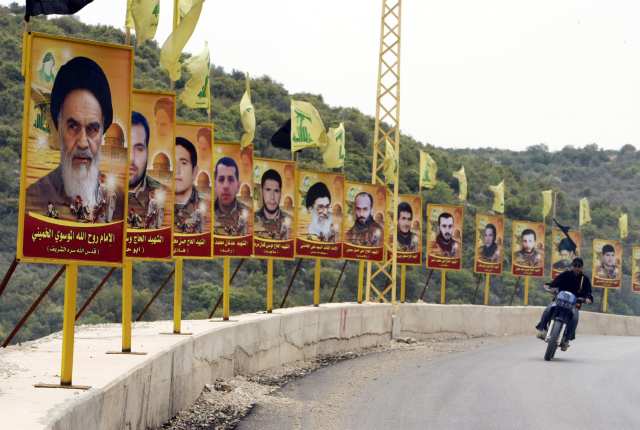 Billboards depicting Hezbollah martyrs line a street in southern Lebanon (image: LA Times)
Billboards depicting Hezbollah martyrs line a street in southern Lebanon (image: LA Times)
These factors on the home front can be exploited to such an extent that political self-preservation overcomes Iranian pressure, at best forcing Hezbollah to wind down its Syrian presence, and at the very least severely disrupting its patron-client relationship with Iran. An ideal precedent for this can be found in the withdrawal of French forces from Algeria in 1962. After nearly a decade of counterinsurgency, they were not pushed out by the FLN, but pulled out by their own government due to political and ideological pressures.
Political sentiment back home – what military theorist Carl Von Clausewitz refers to as “the Passion” – is unavoidably a component of warfighting power, and can be attacked and destroyed just like the more tangible components. Hezbollah’s “Passion” for the Syrian war back home in Lebanon is in a precarious position, and is ripe for attack.
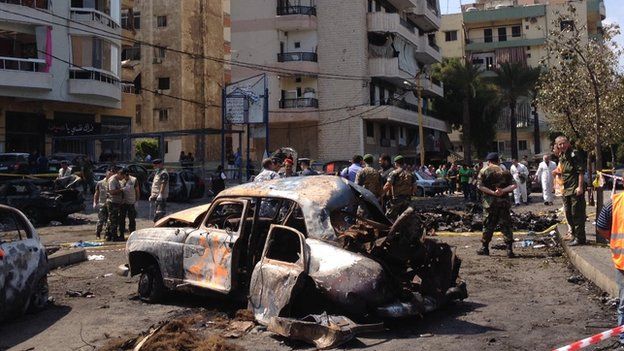 Sectarian tensions have increased in Lebanon as a result of the Syrian conflict (image: BBC)
Sectarian tensions have increased in Lebanon as a result of the Syrian conflict (image: BBC)
Such an attack in this sense would clearly transcend the military realm, also penetrating the psychological. Looking into the actual what and how of implementing a counter-Hezbollah psychological operations (PSYOPS) campaign is beyond the remit of this author, but the pertinent point is that both Western and Russian militaries are nurturing this non-lethal capability, and using it in support of their interests in Syria.
In Hezbollah’s shaky motivations for bolstering the Syrian regime, there lies an opportunity for the anti-Assad coalition to regain the initiative they lost in June 2014, by hastening Hezbollah’s exit from the war they don’t want to be part of. Western PSYOPs campaigns should assault the pre-existing political vulnerabilities outlined above, whilst quiet diplomatic deals might simultaneously open the door for Hezbollah’s withdrawal, thereby reducing Iran’s influence as Hezbollah’s existential life-giver and puppet-master.
By guest writer, Anonymous


